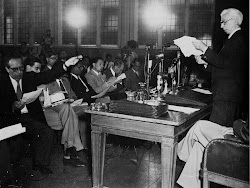Today Obama said,
"There are those who doubt whether true international cooperation is possible, given inevitable differences among nations. And there are those who hear talk of a world without nuclear weapons and doubt whether it's worth setting a goal that seems impossible to achieve. But make no mistake: We know where that road leads. When nations and peoples allow themselves to be defined by their differences, the gulf between them widens. When we fail to pursue peace, then it stays forever beyond our grasp. We know the path when we choose fear over hope. To denounce or shrug off a call for cooperation is an easy but also a cowardly thing to do. That's how wars begin. That's where human progress ends."Here is an excerpt of the 1958 Vienna Declaration (which Rotblat called the "tenet" or "credo" of the Pugwash movement) that shows not just Pugwash optimism, but also Pugwash pragmatism about the road to disarmament:
"The armaments race is the result of distrust between states; it also contributes to this distrust. Any step that mitigates the arms race, and leads to even small reductions in armaments and armed forces, on an equitable basis and subject to necessary control, is therefore desirable. … We recognize that the accumulation of large stocks of nuclear weapons has made a completely reliable system of controls for far-reaching nuclear disarmament extremely difficult, perhaps impossible. For this disarmament to become possible, nations may have to depend, in addition to a practical degree of technical verification, on a combination of political agreements, of successful international security arrangements, and of experience of successful cooperation in various areas. Together, these can create the climate of mutual trust, which does not now exist, and an assurance that nations recognize the mutual political advantages of avoiding suspicion."
I'll return to the Vienna Declaration in other posts, as it many other important elements...
Did you know? At the end of the Third Pugwash Conference, a meeting with about 10,000 people took place in the Vienna City Hall Auditorium, the largest Pugwash conference attendance ever.
Check it out: I just discovered this Oregon State University Special Collections web site that shows Linus Pauling's suggested draft revisions for the Vienna Declaration. Rotblat in the short 1962 history* says this statement was first drafted by Eugene Rabinowitch, with comments from others prior to the meeting. Szilard, following a quirky tradition of his own, ultimately abstained from signing.
*J. Rotblat, Science and World Affairs: History of the Pugwash Conferences, London: Dawsons of Pall Mall, 1962.




